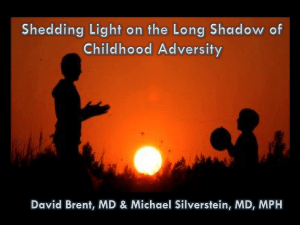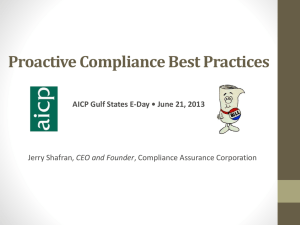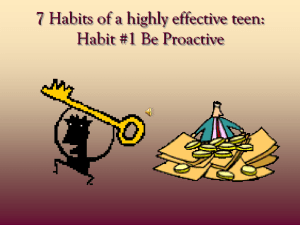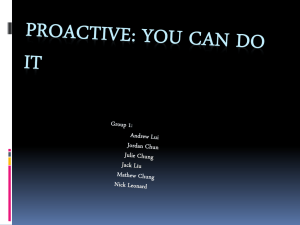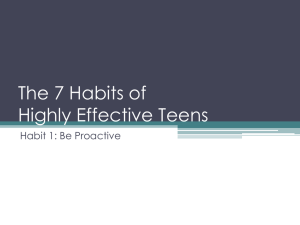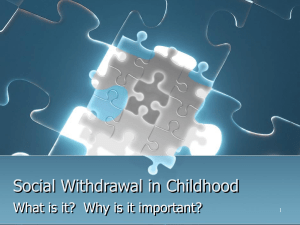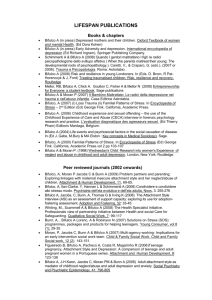Document
advertisement
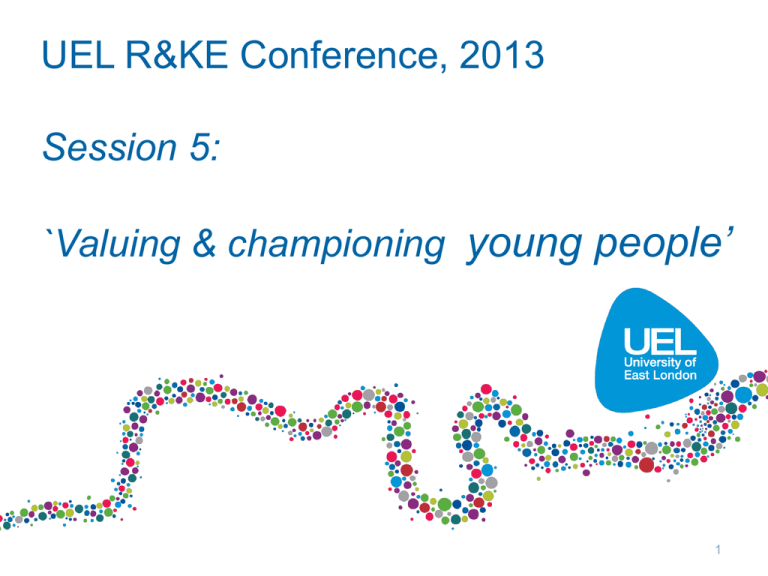
UEL R&KE Conference, 2013 Session 5: `Valuing & championing young people’ 1 Rebelliousness & attachment difficulties as legacies of parental neglect in childhood Mark R. McDermott Nilupa B. Barik & UEL School of Psychology Rebelliousness defined `…wanting or feeling compelled to do something contrary to that required by some external agency’ (Apter, 1982) p.198) …wanting to oppose a perceived requirement The prevalence of rebellious experience Balswick & Macrides (1975) • asked 400 college students: …how rebellious as teenagers had you felt toward parents & other authorities? • 1 in 5 (20%) said `very’ or `extremely’ • only 14% of males & 21% of females said `not at all’ Cultural exemplars (?) – a random sample 2011 UK riots; Occupy London 2011-12; Gezi Park, 2013; Tiananmen Square, 1989; Poll Tax Riots – 1990 & 1381 (Peasant’s Revolt); Greenham Common Women’s Peace Camp 1982/84; Femen; Pussy Riot; Protestant non-conformism 1555, in E15,18 executed; the Venetian interdict 1605-7; whistle blowing; The Origin of Species; lower case & ee cummings; the blank page in `Tristram Shandy’ (1759); gorilla gardening; dissent & the DSM5; Robert Edwards, IVF pioneer; H-Block hunger strikers; Emmeline Pankhurst; Vivien Westwood; Kurt Cobain; John McEnroe; Erdem Gunduz; Voltaire; Nelson Mandela …rebellion as reaction to unjust authority `Standing Man’ (Erdem Gunduz )protest reaches Turkish embassy in Milan …collectively defining a situation as unjust • Gamson, Fireman & Rytina (1982) • Cultural exemplar: `kettling’ Linguistic representations Rebel Radical (Human rights) Activist Protester Freedom fighter Terrorist Prosocial vs antisocial rebellion …`far more, and far more hideous, crimes have been committed in the name of obedience than have ever been committed in the name of rebellion’ C.P. Snow (1961) Serious, reactive rebellion & playful, proactive rebellion…(?) Theoretically understanding the antecedents of rebelliousness • Socio-situationally (interpersonally): models of social influence (Kelman; Deutsch & Gerard; Milgram) • Developmentally (ontologically): models of attachment (Bowlby; Ainsworth) • Personality (dispositionally): models of individual differences (Costa & McCrae) • Phenomenologically (experientially): models of motivation (Apter) Attachment difficulties defined Recurrent difficulties forming and maintaining emotionally close & trusting relationships with others What we did, in short… • Self-report questionnaire measures of : …Proactive & reactive rebelliousness (DVs) …Attachment style in adulthood (IVs) …Recalled parenting style (IVs) …Demographic information (IVs) • Respondents: 35 women, 45 men, (18-50 yrs; mean = 25 yrs., sd 7.45) A bit more re the measures • DVs: Social Reactivity Scale – Rebelliousness (proactive & reactive) (McDermott & Apter, 1987) IVs: • Revised Adult Attachment Scale (comfortable with closeness; can depend on others; fear of abandonment) (Collins, 1996) • Parental Style (indifferent; abusive; controlling) (Parker et al, 1997) • Family Relationships in Childhood Q’nnaire (antipathy; neglect) Questionnaire Version-3 derived from the `Childhood Experience of Care & Abuse interview’ – CECA; Bifulco, 2011) Example questionnaire items Indifferent: s/he was uninterested in me… Abusive: made me feel unsafe… Over controlling: over controlling of me… Antipathy: did not like me as much as my brother/sister.. Neglect: leave me unsupervised before I was 10 years old… Findings: re attachment 1. Self-reported parental neglect is independently associated with feeling uncomfortable with closeness & intimacy (`insecure attachment’) 2. Being uncomfortable with closeness & intimacy independently of other variables correlates with proactive and reactive rebelliousness Findings: re parenting 1. Retrospective reports of maternal & paternal `neglect’ independently covary with proactive & reactive rebelliousness 2. Maternal indifference independently covaries with reactive rebelliousness 3. Paternal indifference, and abusive parenting style are independently associated with selfreported proactive rebelliousness in adulthood Tentative model Conclusions 1. Parental neglect & indifference are forms of childhood adversity that constitute antecedents of both the sensation seeking form of rebelliousness (proactive) & the disaffected form (reactive) in adulthood. 2. Such adversity also is related to feelings of discomfort in adult relationships which in turn may also fuel nonconformity in adulthood. Broader context & implications • These findings are similar to those of Bifulco and others re the relationship between childhood experience of care & abuse (CECA) and measures of antisocial behaviour • The pervasiveness of childhood adversity is concerning since it may underpin a concomitant prevalence of disaffection, `trait’ rebelliousness and antisocial behaviour in adulthood Illustrating the pervasiveness of childhood adversity Bifulco (1994) randomly sampled 300 mothers from GP registers in north London. She asked them whether they had experienced any one of three kinds of abuse before the age of 17: neglect, physical, or sexual abuse. 29% (nearly 1 in 3) reported having experienced one of these three forms of adversity before age 17. Bifulco found such adversity was associated with double the chance of depression in adult life. WHO (2013): 1 in 3 women abused by partner The Big Question Does parental neglect and indifference in childhood in part fuel readiness to cross the line between engaging in legitimate protest against unjust authority versus engaging in unprincipled and sometimes unlawful acts of ‘oppositional’ behaviour? …a longitudinal study is needed! So, impacts, policy & where to `nudge’? • Support for active parenting – Sure Start • Parentline – for those blessed & blasted in equal measure • Early education – disseminating the enormity of Thorndike’s `Law of Effect’ • Evidence-based support for volatile partnerships (eg the Gottman Institute) • Employers supporting `work/family’ balance • Reducing inequality (as after Wilkinson) • Valuing `psychodiversity’ (see next slide) Prologue to this tale of rebelliousness Rebelliousness/conformity is not a `Good/Bad’ dichotomy Getting stuck in one or other state is a Bad Idea Moving flexibly between these two and other states is a Good Thing (ie mental health) and is… `psychodiversity’ …hopefully we are not in a conceptual hole but it is time to stop digging… Indicative bibliography…+ Q&A
